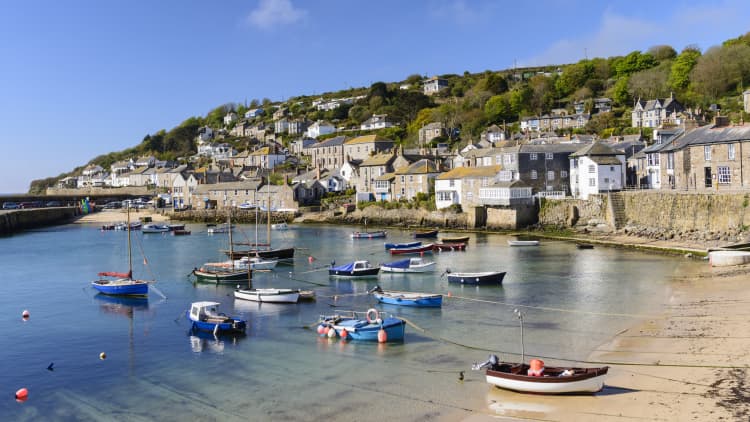After Brexit, the spigot of European Union (EU) funding could start to run dry for Cornwall.
The county in the far southwest corner of England has received more than 1 billion euros in EU funding since 2000, to boost the local economy. Now, faced with uncertainty over Brexit, some Cornwall-based businesses are making preparations for life without the EU.
"Cornwall in the past has had quite a lot of funding from the EU," said Rob Sanders, who founded Glas, an agri-tech startup in Cornwall. "I suppose we're transitioning to where perhaps businesses like ourselves will be able to help generate the economy and keep it running nicely."
Sanders and Colin Phillipson designed Glas to help farmers track key metrics including food supply and animal health. They said Glas will benefit local farmers who are worried about losing subsidies from the EU.
"It's being set up in light of uncertainty from Brexit because people want a way to really monitor how they're doing on the farm business and be able to improve their efficiency and ultimately their profitability," Sanders said.
Glas was created at a partly EU-funded tech incubator called Launchpad, which is located at Falmouth University in Cornwall. Michael Dickinson, commercialization and investment manager at Launchpad, said money from the European Regional Development Fund helped get the program off the ground.
"The funding was there to kickstart the process," he said. "Ultimately, we should be self-sufficient."
Fiona Campbell-Howes also benefited from EU funds to kickstart her business. She moved from London to Cornwall 10 years ago, when she launched her own copywriting agency Radix Communications. She now employs more than a dozen workers and writes for large global firms including Amazon and Oracle.
"The EU funding was really essential to me starting out the business," Campbell-Howes said. "Without it, we wouldn't be where we are today."
Beyond funding, the EU provided Campbell-Howes with support and training for things like management coaching and cash flow. She said her biggest concern about Brexit is that new business owners won't be able to take advantage of these programs like she did.
"Cornwall is a really entrepreneurial county," she said. "There are lots of people here setting up their own businesses, lots of creative people who are setting up creative businesses, but don't necessarily have the kind of business management skills that you need, especially not to get a business off the ground."
Campbell-Howes said she understands that some businesses in Cornwall, like hers, have benefited more than others from EU support. Cornwall's fishing industry, for example, has been vocal about EU restrictions on business and trade. As a county, 57 percent of people in Cornwall voted to leave the European Union.
"We've seen so much here, the impact of the investment, that's not true for everywhere in Cornwall," Campbell-Howes said.
She is now one face of a campaign that's partly funded by the EU to bring more business and investment into Cornwall. "Invest in Cornwall" aims to lure more tech companies and entrepreneurs to the county by touting benefits like high-speed internet connectivity and work-life balance.
Nicola Lloyd, head of inward investment at Invest in Cornwall, said the campaign is part of an effort to futureproof the region's economy.
"Cornwall has always been quite good at coming up with new innovations," Lloyd said.



